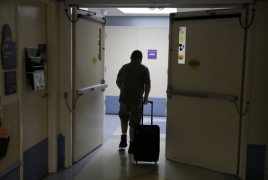American scientists try editing a gene in living body for first time November 18, 2017 - 16:13 AMT PanARMENIAN.Net - Scientists for the first time have tried editing a gene inside the body in a bold attempt to permanently change a person’s DNA to cure a disease, The Associated Press reports. The experiment was done in California on 44-year-old Brian Madeux. Through an IV, he received billions of copies of a corrective gene and a genetic tool to cut his DNA in a precise spot. “It’s kind of humbling” to be the first to test this, said Madeux, who has a metabolic disease called Hunter syndrome. “I’m willing to take that risk. Hopefully it will help me and other people.” Signs of whether it’s working may come in a month; tests will show for sure in three months. If it’s successful, it could give a major boost to the fledgling field of gene therapy . Scientists have edited people’s genes before, altering cells in the lab that are then returned to patients. There also are gene therapies that don’t involve editing DNA. But these methods can only be used for a few types of diseases. Some give results that may not last. Some others supply a new gene like a spare part, but can’t control where it inserts in the DNA, possibly causing a new problem like cancer. This time, the gene tinkering is happening in a precise way inside the body. It’s like sending a mini surgeon along to place the new gene in exactly the right location. “We cut your DNA, open it up, insert a gene, stitch it back up. Invisible mending,” said Dr. Sandy Macrae, president of Sangamo Therapeutics, the California company testing this for two metabolic diseases and hemophilia. “It becomes part of your DNA and is there for the rest of your life.” That also means there’s no going back, no way to erase any mistakes the editing might cause. “You’re really toying with Mother Nature” and the risks can’t be fully known, but the studies should move forward because these are incurable diseases, said one independent expert, Dr. Eric Topol of the Scripps Translational Science Institute in San Diego. Protections are in place to help ensure safety, and animal tests were very encouraging, said Dr. Howard Kaufman, a Boston scientist on the National Institutes of Health panel that approved the studies. He said gene editing’s promise is too great to ignore. “So far there’s been no evidence that this is going to be dangerous,” he said. “Now is not the time to get scared.” Authorities said a total of 192 Azerbaijani troops were killed and 511 were wounded during Azerbaijan’s offensive. In 2023, the Azerbaijani government will increase the country’s defense budget by more than 1.1 billion manats ($650 million). The bill, published on Monday, is designed to "eliminate the shortcomings of an unreasonably broad interpretation of the key concept of "compatriot". The earthquake caused a temporary blackout, damaged many buildings and closed a number of rural roads. Partner news |